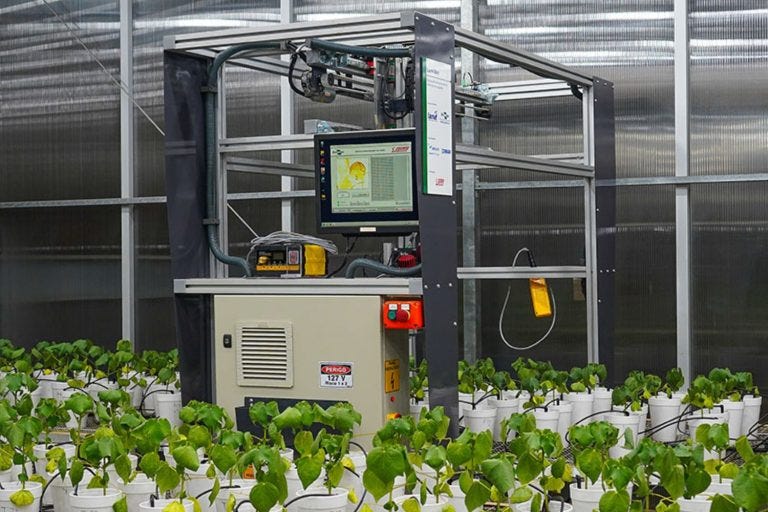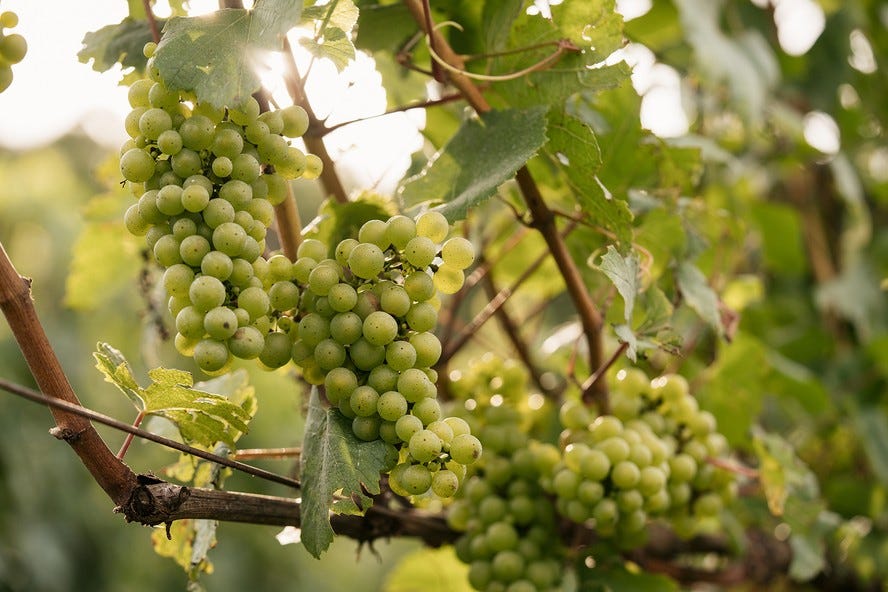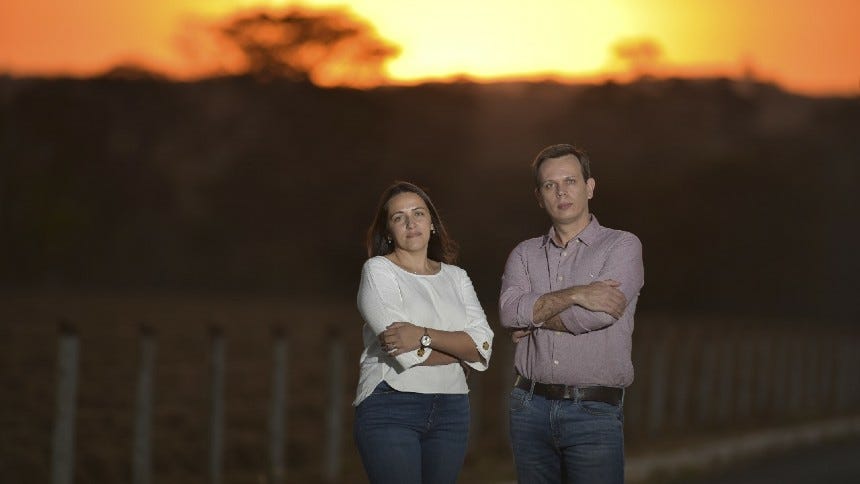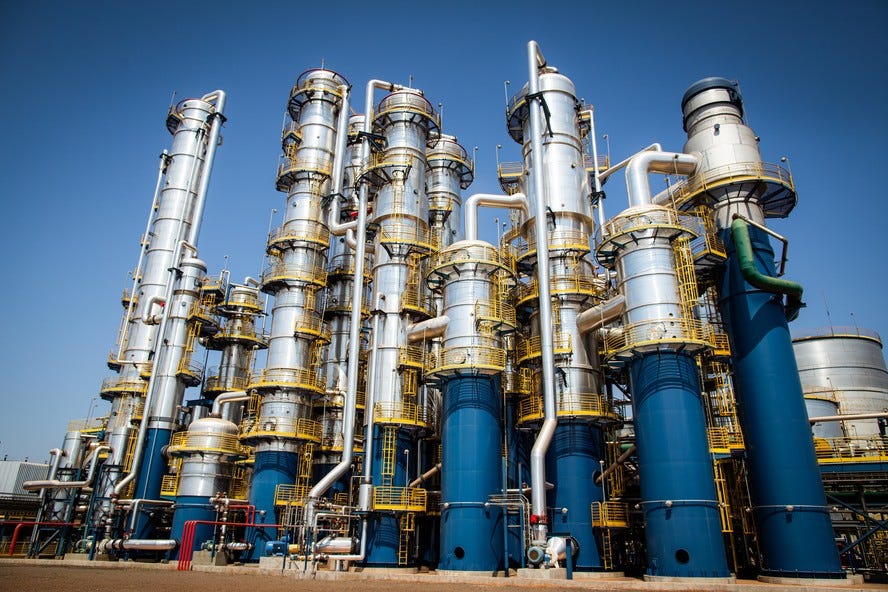Brazil AgTech Report: Soy Signal, Bot Boost, Sustainability Surge, Capital Comeback
#52 BAR Brief
Welcome to this week’s Brazil AgTech Report. Curated news from the frontline of Brazil’s Agri-Climate Tech ecosystem
Summary
In AgTech, Brazil’s physical grains marketplace Grão Direto launched a soybean price index at the Port of Santos to improve price transparency. Embrapa introduced Lumibot, an AI-powered robot that detects early signs of disease in soy and cotton, while Bauer expanded its solar and digital irrigation systems backed by a US$36 million CRA issuance. AgTech adoption keeps accelerating, with farmers now selling up to 20% of their soybean output through online platforms, and tools like Embrapa’s new swine-production app—developed with startup ManejeBem—bringing digital assistance to smallholder pig farmers.
In Climate Tech, the Regenerative Organic Alliance and Regenagri joined forces to launch a certification framework to validate regenerative agriculture, while GreenLight Biosciences filed for approval of Brazil’s first RNA-based fungicide. The Reverte program by Syngenta and Itaú BBA surpassed US$360 million in investments to restore degraded farmland, and Hinove outlined its US$1 billion roadmap for fertilizer expansion and green-ammonia projects by 2030.
In Funding & Investment, Produzindo Certo raised about US$4 million in a round led by Arar Capital and SP Ventures, with participation from The Yield Lab Latam, to expand its verified-farmer network across Latin America. Venture capital activity rebounded sharply, with investments in Brazil nearly tripling to US$1.4 billion in Q3, according to KPMG. Other highlights include Nestlé and Banco do Brasil’s low-carbon dairy credit line and Grupo Colorado’s new CVC arm to back AgTech innovation.
In Macro & Markets, Brazil’s corn-ethanol industry is on track to rival sugarcane by 2034, with projected capacity of 24.7 billion liters driven by integrated grain-energy systems in Mato Grosso. Meanwhile, agricultural and scientific leaders are preparing to position tropical agriculture as a climate solution at COP30 in Belém this month, presenting data on productivity, carbon sequestration, and sustainable intensification to reinforce Brazil’s leadership in low-carbon food production.
🧭 Table of Contents
AgTech
Grao Direto launches new soybean price index for Santos
Embrapa’s Lumibot uses light to detect early-stage crop disease
Digital grain trading grows as farmers sell 20% of soy online
Bauer turns Brazil into its global innovation hub for irrigation
Embrapa and ManejeBem launch app to support small pig farmers
Climate Tech
End of greenwashing: Alliance creates regenerative ag certification
GreenLight Biosciences seeks approval for Brazil’s first RNA-based fungicide
Pulp industry waste finds new use in water-saving farm applications
Reverte program by Syngenta and Itaú expands degraded land recovery
Hinove targets US$1B revenue by 2030 with focus on green fertilizers
Funding & Investment
Produzindo Certo raises US$4 million in major AgTech round
Venture capital investment nearly triples in Brazil in Q3, says KPMG
Nestlé and Banco do Brasil launch credit line for low-carbon milk
Colorado Group launches CVC arm to invest in AgTech startups
Macro & Markets
Corn ethanol poised to rival sugarcane dominance by 2034
Ag leaders unite to promote tropical agriculture as a climate solution at COP30
AgTech
Grão Direto launches new soybean price index for Santos port – Brazil’s physical grains marketplace, Grão Direto, has introduced a soybean price index focused on the Port of Santos to improve market transparency and give local players a better benchmark for trading and hedging contracts. The platform will also integrate the index with its AI system, Airton, launched earlier this year, to provide subscribers with real-time insights and price trend forecasts. read more
Embrapa unveils Lumibot for early crop disease detection – Embrapa, Brazil’s national agricultural research agency, has developed Lumibot, a field robot that uses light sensors and artificial intelligence to detect diseases in soybean and cotton crops at early stages. The system employs multispectral imaging to identify subtle color and reflectance changes in leaves, allowing preventive action before symptoms are visible to the human eye. Developed with the Federal University of São Carlos and Embrapa Soja, Lumibot aims to cut pesticide use, prevent yield losses, and advance precision agriculture in Brazil’s main grain regions. read more
Digital grain trading grows as farmers sell 20% of soy online – Digitalization continues to advance in Brazilian agribusiness, with farmers now selling up to 20% of their soybean production through online trading platforms. The shift reflects growing adoption of digital marketplaces, such as Grao Direto, that offer greater price transparency, faster negotiation, and easier access to buyers. Analysts say digital grain trading could soon represent one-third of Brazil’s sales, driven by younger farmers and improved connectivity in rural areas. read more
Bauer bets on innovation to irrigate growth amid market drought – Facing tighter farm margins and reduced equipment demand, Bauer do Brasil is investing in automation, digital monitoring, and solar-powered irrigation systems to sustain growth. The company recently issued US$36 million (R$200 million) in Agribusiness Receivables Certificates (CRAs) to fund a new dollar-denominated credit line for farmers, with the first US$18 million tranche already completed. Despite global headwinds, Brazil remains Bauer’s main innovation hub—80% of its new solutions are developed locally and exported worldwide. read more
Embrapa and ManejeBem launch app to support small pig farmers – Brazil’s agricultural research agency Embrapa has launched a new digital platform to expand technical assistance for family pig farmers. Developed in partnership with startup ManejeBem, the app provides real-time guidance on animal health, nutrition, and waste management, while allowing farmers to record production data and receive remote support from Embrapa specialists. read more
Climate Tech
Alliance launches new certification to validate regenerative agriculture – The Regenerative Organic Alliance (ROA) and Regenagri have joined forces to create a certification program that verifies and harmonizes regenerative agriculture standards across Brazil. The initiative aims to curb “greenwashing” by setting clear, measurable criteria for soil health, biodiversity, and social impact. Participating farms will undergo independent audits to ensure compliance, offering greater transparency to consumers and buyers. read more
GreenLight Biosciences seeks approval for Brazil’s first RNA-based fungicide – U.S.-based biotech company GreenLight Biosciences has filed for regulatory approval of the first RNA-based fungicide in Brazil. The product uses RNA interference (RNAi) technology to control powdery mildew, a fungal disease that affects grape productivity and quality. Designed to target pathogens with high specificity and minimal environmental impact, the innovation could offer an alternative to conventional chemical fungicides. read more
Pulp industry waste finds new use on farms to save water – Researchers have developed a method to reuse cellulose production residues as soil conditioners to improve water retention and reduce irrigation needs. The byproduct, once discarded by the pulp and paper industry, can increase soil moisture by up to 30% and boost nutrient availability. Trials on farms in São Paulo and Paraná show promising results for both crop yields and sustainability metrics. read more
Reverte program surpasses US$360 million to restore degraded farmland – The Reverte initiative, created five years ago by Syngenta and Itaú BBA, has already invested over US$360 million (R$2 billion) to recover 279,000 hectares of degraded pastures across 11 Brazilian states. The program helps farmers restore soil fertility and productivity through regenerative practices, financing solutions, and technical assistance. Its goal is to reach 1 million hectares of restored land by the end of the decade. read more
Hinove targets US$1B revenue by 2030 with focus on green fertilizers – Brazilian agribusiness group Hinove is investing heavily in fertilizer expansion and green ammonia production as part of its strategy to reach US$1 billion in annual revenue by 2030. The company plans to scale domestic fertilizer supply to reduce import dependence while developing green ammonia projects using renewable energy. read more
Funding & Investment
Produzindo Certo raises US$4 million in new AgTech funding round – Sustainability platform Produzindo Certo has raised US$4 million (R$20.7 million) in a round led by Arar Capital and SP Ventures, with participation from The Yield Lab Latam, SLC Ventures, and Agroven. The company connects global buyers and financial institutions with verified sustainable farmers across Brazil and Latin America, using farm-level data to track environmental and social practices. The funds will accelerate expansion, strengthen digital certification tools, and scale programs like Reg.IA (regenerative soy and corn) and Bov.IS (sustainable beef). read more
Venture capital investment nearly triples in Brazil in Q3, says KPMG – Venture capital investment in Brazil surged to US$1.4 billion in the third quarter of 2025, nearly three times higher than the previous quarter, according to KPMG’s latest survey. The rebound follows a sluggish first half and reflects renewed investor confidence, with fintech, healthtech, and AgTech among the most active sectors. Improved macroeconomic stability have helped reopen the funding pipeline, with larger later-stage rounds returning to the market. read more
Nestlé and Banco do Brasil launch credit line to cut dairy emissions – Nestlé and Banco do Brasil have created a sustainable credit line of up to US$150,000 per producer to finance low-carbon technologies in the dairy sector. The initiative, part of Nestlé’s “Net Zero Milk” program, supports 1,500 partner farmers in adopting methane-reducing practices such as improved feed efficiency, manure management, and renewable energy use. The program aligns with Nestlé’s global climate goals and Banco do Brasil’s Green Finance framework, aiming to decarbonize Brazil’s dairy chain while boosting productivity. read more
Grupo Colorado launches CVC arm to invest in AgTech and innovation – Traditional sugar and ethanol producer Grupo Colorado has launched Colorado Ventures, a corporate venture capital arm aimed at investing in startups that create new growth fronts for the company. Led by the family’s third generation, the initiative focuses on technologies in precision agriculture, renewable energy, and digital operations. Alongside the CVC, Grupo Colorado is advancing automation, drone monitoring, and AI tools to improve efficiency and sustainability across its sugarcane operations. read more
Macro & Markets
Corn ethanol set to surpass sugarcane’s long dominance – Brazil’s corn ethanol industry is rapidly expanding and could soon overtake sugarcane, according to projections by consultancy Datagro. With plants currently operating, under construction, and in development, installed capacity is expected to reach 24.7 billion liters by 2034, nearly matching the 25 billion liters produced annually from sugarcane—a figure that is not expected to grow in the next decade. Corn ethanol’s rise is driven by its ability to complement soybean production in the center-west region, where integrated grain and biofuel operations improve logistics and generate valuable byproducts like DDG for feed. read more
Ag leaders unite to position tropical agriculture as a climate solution at COP30 – Prominent figures from Brazil’s agribusiness, scientific, and sustainability communities are forming a coalition to showcase tropical agriculture as part of the climate solution at COP30 in Belém this month. The group includes representatives from Embrapa, CNA, SRB, and private-sector institutions working to present data on productivity, carbon sequestration, and sustainable intensification. Their goal is to strengthen Brazil’s role as a global reference in low-carbon food production while countering misconceptions about tropical systems through a unified platform at the global summit. read more
That’s all for this week, thanks for reading,
KFG
Kieran Finbar Gartlan is an Irish native with over 30 years of experience living and working in Brazil. He is Managing Partner at The Yield Lab Latam, a leading venture capital firm investing in Agrifood and Climate Tech startups across Latin America.







The Net Zero Milk program's structure is smart because it addresses the financing gap that often prevents dairy farmers from adopting emission reduction tecnologies. Linking Banco do Brasil's green finance framework with Nestlé's supply chain creates direct accountability and traceability for both climate impact and farmer productivity. Brazil's dairy sector is already competitive globally, so this could become a blueprint for how multinationals can partner with local banks to decarbonize agricultural supply chains in emerging markets.